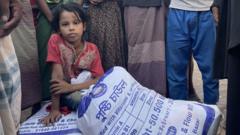When 17-year-old Kajol fell ill with tuberculosis (TB) in January, USAID's support was a lifeline. However, the recent sweeping cuts to US aid implemented by the Trump administration have placed her health—and that of her family—back in jeopardy. TB, a notoriously prevalent disease in impoverished areas like Mohammadpur, Dhaka, requires consistent treatment to prevent fatal consequences. Kajol, the main provider for her family, was initially able to access treatment through a local organization called Nari Maitree, funded by USAID, until funding ceased abruptly in February. This decision risks transforming a manageable health issue into a much more dangerous TB strain and contributes to the healthcare burdens faced by many in Bangladesh where the government’s resources are limited.
Dipa Halder, who has tirelessly worked to educate and treat poor communities for TB, voiced her concerns, stating that financial assistance for patients is critical. Reports indicate that over a quarter of a million new TB cases were identified in 2023 thanks to USAID's efforts. In stark contrast, the current aid cut from $500 million last year to a mere $71 million demonstrates an alarming trend that could lead to worse health outcomes, job losses in the NGO sector, and the end of essential programs.
In a broader humanitarian context, the cuts also profoundly impact the Rohingya refugee camps in Cox’s Bazar, home to over one million displaced people. These refugees rely heavily on international aid for survival, with USAID previously providing nearly half of all necessary support. With an acute shortage of basic necessities like food and sanitation projecting serious health crises, the repercussions are dire. Humanitarian leaders warn that unless funding is reinstated, the situation could escalate into widespread despair and insecurity.
The abrupt suspension of crucial USAID programs has not only resulted in significant job losses across healthcare initiatives but has cast a shadow on the well-being of vulnerable populations already teetering on the brink. The uncertainty and lack of resources present a complicated and potentially devastating scenario for both TB patients and the Rohingya, leaving families like Kajol's and Rehana Begum's struggling to navigate an increasingly bleak reality.






















